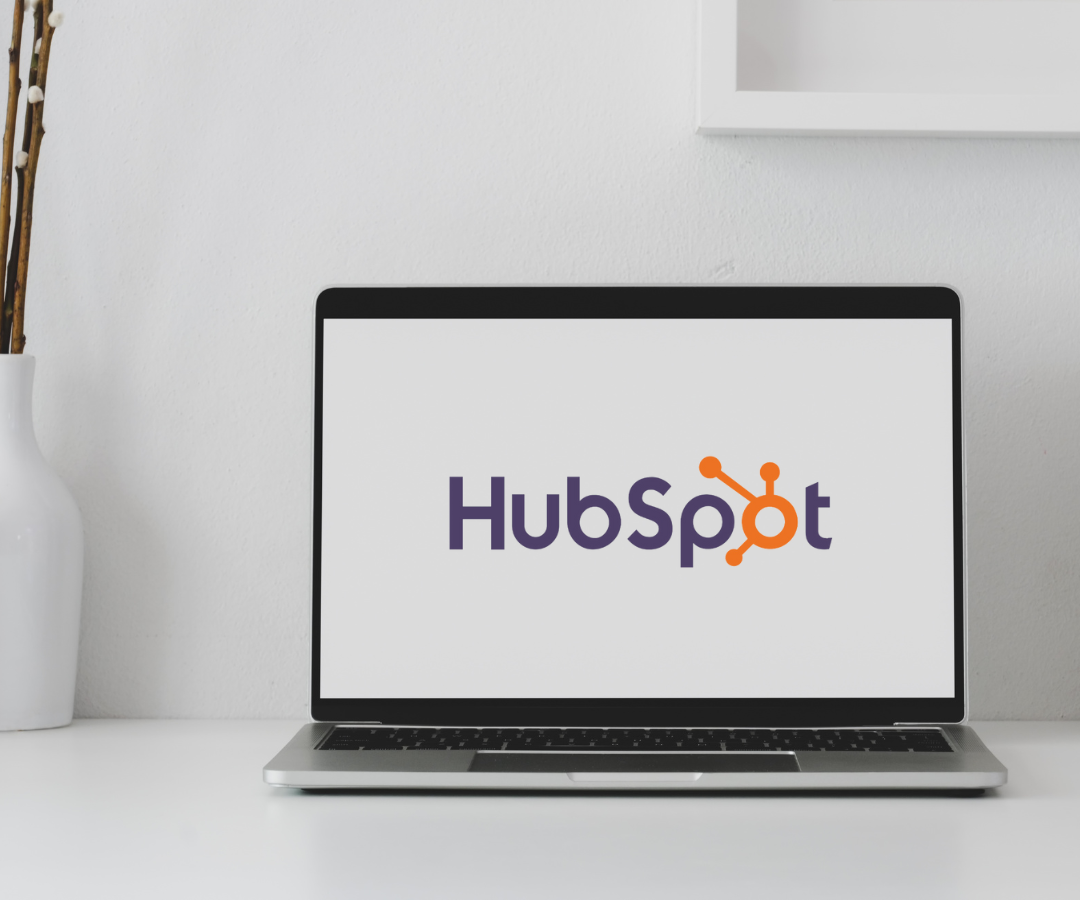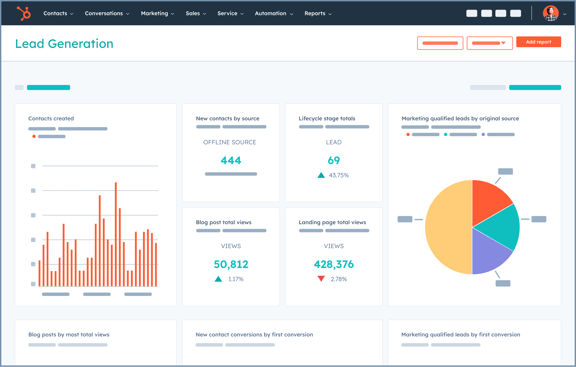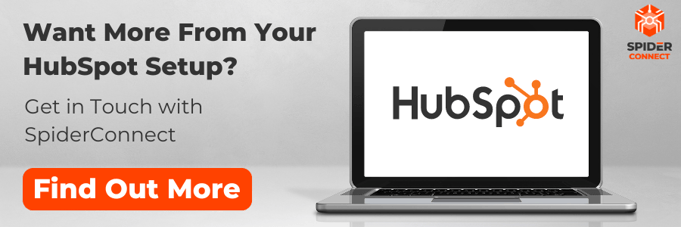What’s the Difference Between Sales Hub & Marketing Hub?

HubSpot has become a go-to software for digital marketing agencies looking to adopt an inbound methodology. At the core of HubSpot's platform are two robust tools - Sales Hub and Marketing Hub. These products help agencies attract, engage, and delight customers through targeted content, automated workflows, and integrated data.
In this blog post, we'll explore the key differences between HubSpot's Sales Hub and Marketing Hub. We’ll help you to understand the unique capabilities of each product and how they enable agencies to leverage them. Just some of these include campaign creation, landing page development, lead nurturing, and sales enablement.
With the right inbound marketing and sales stack, agencies can align their sales and marketing teams while providing superior customer experiences.
By the end of this post, you'll have a clear overview of what sets these two major HubSpot hubs apart. You'll also learn how they work in tandem to support the stages of the inbound methodology - attracting strangers, converting them to leads, closing leads as customers, and captivating those customers.
Understanding HubSpot Sales Hub
HubSpot Sales Hub is an all-in-one sales software that empowers teams to have more effective and efficient conversations with leads and customers. This tool provides sales representatives with features to manage the entire sales process. Depending on the company, this might include email sequencing, calling, meeting scheduling, and deal tracking.
Sales Hub aims to streamline the sales process so reps can focus on having meaningful interactions with prospects. Built-in templates, sequences, and analytics enable reps to save time on administrative tasks. With custom emails, calls-to-actions, and follow-up cadences, Sales Hub makes every touchpoint on-brand, personal, and impactful.
Key benefits of Sales Hub for sales teams include:
-
Increased productivity - Automated sequencing and task prioritisation can help reps stay on top of numerous deals in their pipeline.
-
Improved visibility - Robust analytics provide insights into deal progress, rep performance, and sales velocity.
-
Enhanced collaboration - With a shared workspace, sales and marketing teams can align on strategy to drive conversions and hand over leads more effectively.
-
Personalised engagement - Dynamic content and messaging options help reps provide tailored outreach to prospects.
With robust tools to manage deals from contact to close, HubSpot Sales Hub is essential for streamlining the sales process and delighting customers. This HubSpot sales hub saves time for sales teams by automating busywork and providing actionable data to prioritise the most promising leads.
Exploring HubSpot Marketing Hub
This all-in-one marketing platform provides tools to create campaigns, design landing pages, manage contacts, nurture leads, and analyse performance.
At its core, Marketing Hub aims to support inbound marketing methodology through automated workflows and integrated data. Features like blogging, social media publishing, email marketing, and SEO optimisation tools help marketers execute targeted campaigns to connect with interested prospects and convert them into happy customers.

Key benefits of Marketing Hub for marketing teams include:
-
Increased efficiency - With marketing automation, teams can nurture leads and customers without manual follow-ups.
-
Enhanced credibility - Lead nurturing and content creation to establish expertise and build trust with prospects.
-
Improved reporting - Robust analytics provide insights into campaign ROI, lead sources, and engagement
-
Added flexibility - A wide range of templates and customisation options enable branded assets.
With its inbound marketing features and integration with Sales Hub, HubSpot Marketing Hub gives marketers the tools they need to attract and delight customers. This marketing automation helps teams scale campaigns and strengthen their marketing strategies through data-driven insights.
Unpacking HubSpot's Sales and Marketing Tools
Target Audience and Focus
Sales Hub and Marketing Hub cater to different users and teams within an organisation. Sales Hub provides sales representatives and teams with tools to manage relationships and close deals. Marketing Hub, on the other hand, enables marketing professionals to run inbound campaigns and nurture leads.
The Sales Hub interface focuses on sales tasks like email sequencing, calling, meeting scheduling, and deal tracking. This supports sales teams in having effective conversations that convert leads into customers.
Marketing Hub takes a different approach, giving marketers website and landing page builders, blogging, social media, and automation tools. These features aid in attracting and engaging potential customers through inbound marketing.
While Sales Hub streamlines the sales process, Marketing Hub executes strategies for long-term lead nurturing and brand building. Both solutions provide value to their respective teams with specialised features that align with users' goals.
Core Functionalities
The core functions of Sales Hub include CRM, email automation, meeting scheduling, reporting, and pipelines. This software centralises sales tasks to optimise productivity. Built-in sequences, templates, and analytics also allow sales teams to have more personalised and impactful interactions.
Meanwhile, Marketing Hub focuses on website management, blogging, social media, SEO, email, and campaign creation. Marketers can execute strategies across channels to generate and nurture leads. Robust analytics also provide data to refine campaigns and demonstrate ROI.
Where Sales Hub manages the sales process from contact to close, Marketing Hub supports inbound methodologies to attract and convert strangers into leads. Sales Hub directly enables sales tasks while Marketing Hub aids brand building for the long term.
Lead Generation and Nurturing
With its CRM and analytics, Sales Hub helps generate new leads through sales team outreach and referrals. Lead scoring and tracking features allow reps to identify and prioritise promising prospects.
Marketing Hub takes the lead in long-term lead nurturing through automated emails, landing pages, and customised content. These tools slowly guide leads through the sales funnel, establishing value before handing off to sales.
Together, the Hubs provide a well-rounded approach to lead management. Marketing works top-of-funnel using automation and content to educate. Sales follow-up through personalised outreach to qualified prospects.
Campaign Management and Automation
Both Hubs offer campaign creation and automation capabilities, but with different areas of focus. In Sales Hub, users can build email campaigns and sequences targeted at prospects. These automate touchpoints like follow-ups, pitches, and meeting requests.
Marketing Hub enables more robust campaign management across channels like social media, SEO, blogging, and events. Users can nurture leads through the buyer's journey with automated content.
The combined power of these tools helps teams scale engagement across a lead's lifecycle. Marketing automation identifies and attracts potential buyers. Sales automation accelerates lead conversion through hyper-targeted sequences.
Reporting and Analytics
Robust reporting and analytics are available in both Sales and Marketing Hubs.
Sales Hub offers data on deal performance, pipeline trends, and sales rep productivity. Marketers can track campaign ROI, lead generation sources, landing page conversion, and more.
These insights support data-driven decision-making on both teams. Sales reps can adjust their outreach and managers can optimise sales processes. Marketers can improve campaigns and assets based on performance data.
Integration with Other HubSpot Services
A major advantage of Sales and Marketing Hubs is their seamless integration with the broader HubSpot ecosystem. Sales Hub integrates with HubSpot CRM for centralised lead data. Marketing Hub brings in dynamic content from HubSpot CMS.
Bringing together these HubSpot solutions creates a powerful sales and marketing stack. Shared data between hubs ensures alignment on contacts, deals, and campaigns. This synergy between teams helps create consistent messaging and experiences.
Customisation and Scalability
Both Sales and Marketing Hubs are highly customisable to meet specific business needs. Sales Hub offers workflow automation, segmented email templates, customised reports, and more.
Similarly, Marketing Hub provides flexibility in templates, landing pages, blogging, and automation. As teams scale, both solutions can expand with customisable modules to match growth.
This tailoring and scalability empowers each team to maximise their HubSpot tools. As needs change, workflows, assets, integrations, and more can be adjusted.
Conclusion
While Sales Hub and Marketing Hub have distinct capabilities, they work best together. Sales Hub gives sales teams tools to drive conversions. Marketing Hub empowers marketers to attract and nurture leads.
Used together, these hubs enable alignment between sales and marketing with shared data and workflows. This integrated strategy allows for an effective inbound methodology that covers the entire customer lifecycle - from stranger to promoter.
In summary, the synergies between Sales Hub and Marketing Hub can help agencies execute robust campaigns, optimise processes, and boost revenue. Leveraging both hubs at an optimised level leads to marketing and sales success.
Contact us today for more advice and support on all things HubSpot!

Sign up for our newsletter to receive updates on new features and releases.